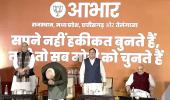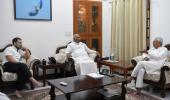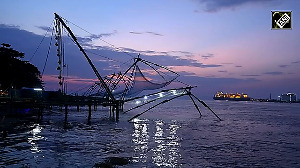'Bihar, Maharashtra, Karnataka, Bengal can be the game changers of 2024.'

"Welfarism only works when it is backed by bharosa [trust] -- and bharosa is Narendra Modi along with a combination of factors like cultural and muscular majoritarianism," notes political commentator Rasheed Kidwai.
"The challenge for INDIA is the prime ministerial face: Modi versus who? If the alliance targets Modi, they are doomed and if they don't, he gets away with everything, therefore, it is a difficult conundrum for the INDIA alliance," Kidwai tells Rediff.com's Archana Masih.
What is the Congress's future in North India? Is resurrection even possible?
The result was not as expected by the Congress, but the party can draw heart from the fact that it has held onto its vote share in the Hindi Heartland.
The states of Rajasthan, Madhya Pradesh, Chhattisgarh comprise over 90% majority community, unlike Bihar, West Bengal or UP which has a sizable minority population.
The Congress has got 40% vote share from this majority population. The BJP has benefited at the expense of votes lost by other parties [like the Bahujan Samaj Party]. Although this is a cause of concern, it shows that the roots of the Congress are intact in this region.
How does this likely impact the Congress' performance in 2024 because it fared abysmally in these states in 2019?
The Congress had won these three states in the 2018 assembly election, but six months later conceded 62 out of 65 Lok Sabha seats to the BJP. In the worse-case scenario, the Congress can lose three more seats, and the BJP can gain three seats if it does very well.
The situation remains bleak for the Congress in 2024 in the Hindi heartland, similar to 2014 and 2019.
But the win in Telangana, which has 17 Lok Sabha seats, opens up the possibility for the Congress to pick up 10+ seats in 2024 from Telangana.
In Parliamentary democracy, MPs elect the prime minister, but in 2014 and 2019, the PM got 282 and 300 MPs elected to Parliament on his own strength. And now that trend appears to have moved to the state elections as well.
The prime minister has shown that he has the ability and influence to even get MLAs elected. The common thread in these states was Narendra Modi -- not welfare schemes like Ladli Behna. The chief ministers of Chhattisgarh and Rajasthan were also recklessly pursuing welfare and pro-women policies, but it did not help them return to power.
Such welfarism only works when it is backed by bharosa [trust] -- and bharosa is Narendra Modi along with a combination of factors like cultural and muscular majoritarianism. It is a package.
India is a personality driven polity. During the golden era of the Congress, there was no dearth of quality Opposition, but they could not match up.
They were stalwarts like Ram Manohar Lohia, Jyoti Basu, Charan Singh, Chandrasekhar, Atal Bihari Vajpayee, L K Advani, but they could not pin down Indira Gandhi, except post-Emergency in 1977 through a coalition, but by and large Mrs Gandhi remained formidable. She could outsmart them.
Similarly, in today's time, there is no dearth of good leaders like Nitish Kumar, Mamata Banerjee, Sharad Pawar and others, but they are not a match for Mr Modi.

You spoke about the Opposition. What options does the INDIA alliance have if it wants to arm itself against the BJP going into 2024?
The INDIA alliance is not poorer or weaker by the outcome of the state election results. Telangana has given them a hope of gaining around 10 seats in the Lok Sabha 2024.
The alliance needs to get their act together. They need to function as co-equals. The Congress cannot play the dominating partner.
Historically, India's coalition politics has always had a dominant partner -- in the UPA, it was Congress; in the NDA, it was the BJP.
However, the idea of co-equals is easy in theory, but difficult in practice.
The second challenge for INDIA is the prime ministerial face: Modi versus who?
If the alliance targets Modi, they are doomed and if they don't, he gets away with everything, therefore, it is a difficult conundrum for the INDIA alliance.

The inability to come up with seat sharing agreement dented their chances in these assembly elections. The INDIA alliance is also plagued by egos and conflicting voices emerging from 28 different parties.
Firstly, they need a seat-wise, nation-wide alliance backed by data, not the whims and fancies of different leaders.
Data science and strategists like Sunil Kanugolu can help them figure out who is best suited to contest from individual constituencies. They need a consensus on 80%-90% Lok Sabha seats.
The alliance should have a common social media policy and authorised spokespersons. Udhaynidhi Maran's comment had an impact on traditional, conservative, Hindus who have a strong sense of association with Sanatan Dharma. It is difficult to discipline 28 parties, but members should be actively discouraged from making such statements.
The alliance has experienced leaders like Sharad Pawar, Nitish Kumar, Mamata Banerjee, Sitaram Yechuri who understand politics and can look at issues dispassionately.
They should have an active team on the ground comprising Akhilesh Yadav in UP, Tejaswi Yadav in Bihar, Stalin in Tamil Nadu, etc. Leaders like Mallikarjun Kharge, Sonia Gandhi, Nitish Kumar and Sharad Pawar should provide heft in establishing cohesiveness among the partners.
There needs to be a quick response mechanism. For example, the Sanatan Dharma remark went unattended.
Meanwhile, the NDA speaks in the same voice on all social, economic, cultural issues, whereas the outlook of the INDIA alliance is very diverse.
However, this diversity also gels with the civilisational ethos of the country where diversity is welcomed.

Some of the parties in the INDIA alliance were partners of the NDA in 2019 and are now on the opposite side of the BJP. How will this impact the outcome of the 2024 election?
Bihar, Maharashtra, Karnataka and Bengal can be the game changers.
Maharashtra has 48 seats -- the BJP along with united Shiv Sena won 42 seats in 2019. This time the Shiv Sena [UBT], Congress and NCP have the potential to reduce the NDA tally by half.
Bihar: The BJP-Janata Dal-United alliance won 39/40 seats. This time, the JD-U, Rashtriya Janata Dal and Congress are in a coaltion which will enhance their collective potential.
Bengal: The BJP won 18/42 seats. Mamata has the capacity to reduce it to a single digit in 2024.
Karnataka: The BJP won 25/28. The Congress has the potential to reduce it to a single digit in 2024.
The southern states, along with other states in north-western, central, eastern India have the potential to reduce the number of seats for the BJP.
The Congress should look at expanding Rahul Gandhi's Bharat Jodo Yatra to Odisha, Bengal, Bihar and the North East. Therefore, the yatra that he intends to do from east to west will carry some hope for them, but it has to have effort.
The Congress and the INDIA alliance also need a composite outlay to deal with communalism.
India's civilisational ethos is diverse and accommodative. It is do-able and this counter-narrative can be shaped. The southern and eastern states are accepting it, so they can find a solution in north India also.
The alliance needs ideological fine tuning. They need to be sure footed.
- Part 2 of the Interview: 'Congress doesn't have hunger...'
Feature Presentation: Aslam Hunani/Rediff.com











 © 2025
© 2025